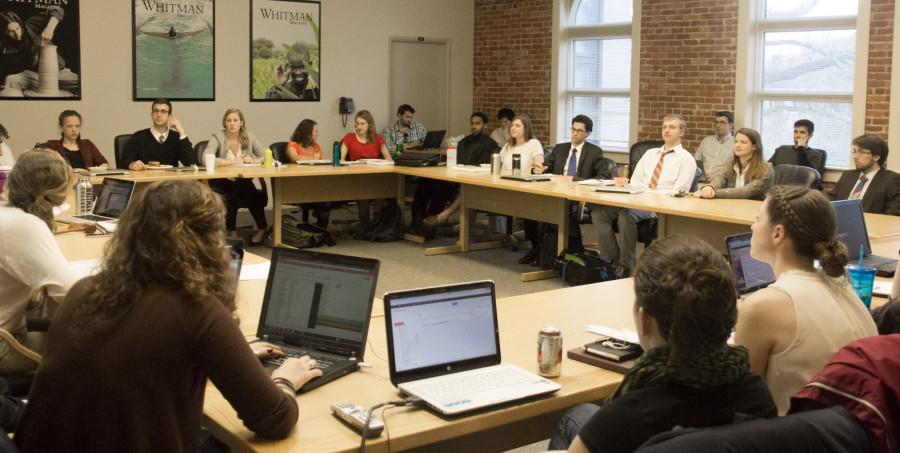The fate of Waiilatpu and a resolution advocating for limiting the college’s fossil fuel investments were decided at an ASWC Senate meeting held last Sunday night.
Though its status as an ASWC-funded organization was momentarily in question, production and publication of the yearbook will be continued next year, albeit with less funding than requested. Meanwhile, the Divestment Campaign received cautious support from ASWC, with senators passing a resolution by a 16-1-2 vote advocating for limiting new investments in fossil fuels.
First-year Senator Jack Percival wrote the resolution with the help of Senior Senator Marcial DÃaz MejÃa after gathering information from talks with Divestment Campaign and the divestment student hearing two weeks ago.
“In the initial stages, we kind of determined that it wasn’t best to write a resolution that flat-out advocated for complete immediate and unconditional divestment in fossil fuels,” said Percival. “It was something that would be unpalatable to a lot of students and the trustees, I think, just because of economic viability.”
The resolution first advocates for limiting new investment in unsustainable energy, with a focus on coal.
“The resolution was pertinent to coal, because I don’t think it’s economically viable and it is one of the worst for emissions,” said Percival.
A second measure in the resolution encourages the creation of a committee of students, faculty and trustees to investigate divestment issues and look into green managers.
“It would be like a college committee specifically devoted to exploring divestment,” said Percival.
Another measure included in the original resolution called for the creation of a specifically green fund for investments only in sustainable energy, but Percival amended this measure out of the resolution Sunday night after concern from Campus Climate Challenge members, who were present in Senate during discussion of the resolution.
“By creating a green fund it’s kind of condoning unsustainable practices elsewhere,” said Percival.
Members of Whitman’s divestment campaign saw the resolution as a small but important step in raising climate consciousness, one that allows for more compromise with the college’s administration.
“We see it as a step in the process. It seems like it’s mild; it doesn’t call for divestment in five years [so] it’s not a strict resolution at all. And the reasoning behind that was just that in dealing with the finance people, the higher-ups that deal with portfolios, it’s a hugely complex process,” said first-year Campaign member Erika Longino. “It’s the first step in letting the higher-ups know that climate change is on our mind.”
A contentious debate on the issue of Waiilatpu, the Whitman yearbook, followed the question of divestment. The yearbook was ultimately retained in the bylaws after a vote of 7-11-2, failing to receive the necessary two-thirds majority to decommission the yearbook. A question-and-answer session with sophomore Grant Rommel, the current editor-in-chief, and first-year Meg Logue, who will hold that position next year, brought up many points that have been frequently discussed in recent talks concerning retention of the yearbook.
Senators raised questions of the possibility of creating a digital yearbook instead of, or in addition to, a hard copy edition, though Logue said it wouldn’t be in Waiilatpu’s best interest as a campus media organization.
“Digital undermines what a yearbook fundamentally is,” Logue said before Senate.
Other senators questioned if The Pioneer could merge with Waiilatpu, a possibility Logue said “wouldn’t solve the funding issue.” However, the organizations may be working more closely together next year.
“We’re looking to collaborate with The Pioneer to share some of the resources that would help the yearbook get off of its feet without losing the yearbook’s individuality,” she said.
The yearbook will receive $3,500 from ASWC, which is significantly less than its request of $7,583. Logue and Waiilatpu leadership are trying to explore other mediums of funding.
“We’ve discussed working with Alumni Office to seek donation for the yearbook, make buying pages possible,” she said.
Logue has discussed possibilities of making Waiilatpu resemble the format of the popular blog “Humans of New York,” which posts street photography portraits of a wide variety of individuals throughout the city alongside a brief description of their lives.
She said the yearbook is planning on focusing on revising its content next year to reflect what students want to see.





